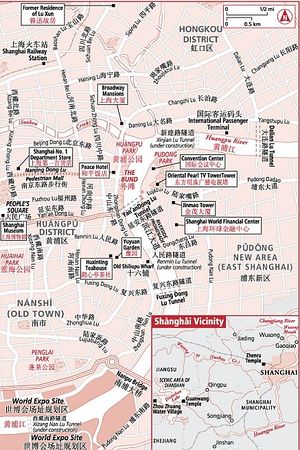Difference between revisions of "Shanghai"
YortKeldher (Talk | contribs) m |
|||
| (11 intermediate revisions by 8 users not shown) | |||
| Line 1: | Line 1: | ||
| − | '''Shanghai''' | + | {{language box |
| + | |pic=Shanghai.jpg | ||
| + | |c=上海 | ||
| + | |p=Shănghaĭ | ||
| + | |w=Shang-hai | ||
| + | }} | ||
| + | '''Shanghai''' is the largest city in China, situated on the Huangpu River close to the mouth of the [[Yangtze River]]. It is the eighth largest city in the world and is a major financial center. Since the 16th century, Shanghai has been a cultural, religious, and political center of China. Shanghai is also home to the largest cargo port in the world. | ||
| + | ==History== | ||
In 1842 Shanghai was one of five ports opened to foreign trade under the provisions of the [[Treaty of Nanjing]]; quasi-colonial foreign concessions governed by the French, British and American communities were established on the waterfront (the ''Bund'') to the north of the walled Chinese city. The British and American concessions later merged to form the International Settlement. | In 1842 Shanghai was one of five ports opened to foreign trade under the provisions of the [[Treaty of Nanjing]]; quasi-colonial foreign concessions governed by the French, British and American communities were established on the waterfront (the ''Bund'') to the north of the walled Chinese city. The British and American concessions later merged to form the International Settlement. | ||
| − | + | [[File:Shanghai1.jpg|thumb]] | |
In 1932 the Chinese municipality of Shanghai was attacked by Japanese marines in the Zhabei district, leading to weeks of heavy fighting. In 1937, Shanghai was [[Battle of Shanghai|attacked by Japanese forces]], prompting the outbreak of the [[Second Sino-Japanese War]]. In 1943, the western powers ceded (de jure) control of the foreign concessions to China, and Shanghai was liberated from the Japanese in 1945. In 1949 it was occupied by Communist forces. The city suffered from underinvestment in the early decades of Communist rule; nevertheless it was a hotbed of radicalism during the [[Cultural Revolution]] of the late 1960s and a base for the [[Gang of Four]]. Since the economic reforms introduced by [[Deng Xiaoping]] in the 1980s it has become one of the most rapidly modernising and dynamic cities in the world. | In 1932 the Chinese municipality of Shanghai was attacked by Japanese marines in the Zhabei district, leading to weeks of heavy fighting. In 1937, Shanghai was [[Battle of Shanghai|attacked by Japanese forces]], prompting the outbreak of the [[Second Sino-Japanese War]]. In 1943, the western powers ceded (de jure) control of the foreign concessions to China, and Shanghai was liberated from the Japanese in 1945. In 1949 it was occupied by Communist forces. The city suffered from underinvestment in the early decades of Communist rule; nevertheless it was a hotbed of radicalism during the [[Cultural Revolution]] of the late 1960s and a base for the [[Gang of Four]]. Since the economic reforms introduced by [[Deng Xiaoping]] in the 1980s it has become one of the most rapidly modernising and dynamic cities in the world. | ||
| + | |||
| + | The Pudong disctrict is the main commercial center of Shanghai and one of the most important. | ||
| + | |||
| + | ==See also== | ||
| + | *[[History of China]] | ||
==References== | ==References== | ||
<references/> | <references/> | ||
| − | [http://www.shanghai.gov.cn/ | + | [http://www.shanghai.gov.cn/ Shanghai Municipality Official Website], ''in Chinese'' |
[[Category:Chinese Cities and Towns]] | [[Category:Chinese Cities and Towns]] | ||
[[Category:Chinese Provinces, Municipalities and Regions]] | [[Category:Chinese Provinces, Municipalities and Regions]] | ||
| + | [[Category:Chinese History]] | ||
| + | [[Category:Urban History]] | ||
Revision as of 13:53, March 5, 2017
| Shanghai | |||||||||
|---|---|---|---|---|---|---|---|---|---|

| |||||||||
| Chinese | 上海 | ||||||||
| |||||||||
Shanghai is the largest city in China, situated on the Huangpu River close to the mouth of the Yangtze River. It is the eighth largest city in the world and is a major financial center. Since the 16th century, Shanghai has been a cultural, religious, and political center of China. Shanghai is also home to the largest cargo port in the world.
History
In 1842 Shanghai was one of five ports opened to foreign trade under the provisions of the Treaty of Nanjing; quasi-colonial foreign concessions governed by the French, British and American communities were established on the waterfront (the Bund) to the north of the walled Chinese city. The British and American concessions later merged to form the International Settlement.
In 1932 the Chinese municipality of Shanghai was attacked by Japanese marines in the Zhabei district, leading to weeks of heavy fighting. In 1937, Shanghai was attacked by Japanese forces, prompting the outbreak of the Second Sino-Japanese War. In 1943, the western powers ceded (de jure) control of the foreign concessions to China, and Shanghai was liberated from the Japanese in 1945. In 1949 it was occupied by Communist forces. The city suffered from underinvestment in the early decades of Communist rule; nevertheless it was a hotbed of radicalism during the Cultural Revolution of the late 1960s and a base for the Gang of Four. Since the economic reforms introduced by Deng Xiaoping in the 1980s it has become one of the most rapidly modernising and dynamic cities in the world.
The Pudong disctrict is the main commercial center of Shanghai and one of the most important.
See also
References
Shanghai Municipality Official Website, in Chinese
